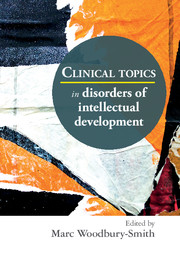Book contents
- Frontmatter
- Contents
- List of contributors
- Foreword
- Preface
- Part 1 Disorders of intellectual development: concept and epidemiology
- Part 2 Disorders of intellectual development: comorbidity and complications
- Part 3 Autism spectrum disorder
- Part 4 Service provision
- 12 Improving the general health of people with disorders of intellectual development
- 13 Bridging the gap: linking primary and secondary care for people with disorders of intellectual development
- 14 Ageing in people with disorders of intellectual development
- 15 Services for children with disorders of intellectual development and mental health needs
- 16 Forensic psychiatry for people with disorders of intellectual development: a personal reflection
- Index
13 - Bridging the gap: linking primary and secondary care for people with disorders of intellectual development
from Part 4 - Service provision
Published online by Cambridge University Press: 01 January 2018
- Frontmatter
- Contents
- List of contributors
- Foreword
- Preface
- Part 1 Disorders of intellectual development: concept and epidemiology
- Part 2 Disorders of intellectual development: comorbidity and complications
- Part 3 Autism spectrum disorder
- Part 4 Service provision
- 12 Improving the general health of people with disorders of intellectual development
- 13 Bridging the gap: linking primary and secondary care for people with disorders of intellectual development
- 14 Ageing in people with disorders of intellectual development
- 15 Services for children with disorders of intellectual development and mental health needs
- 16 Forensic psychiatry for people with disorders of intellectual development: a personal reflection
- Index
Summary
Do words matter?
Different definitions and descriptions may be required for different purposes (Fryers, 1991). Teachers identifying learning difficulties require a different definition from that required by policy makers describing eligibility for services for adults who need support or welfare benefits. The needs of epidemiologists are different to the needs of criminal prosecutors. The definition (of mental retardation) the World Health Organization (WHO) used in ICD-10 is ‘a condition of arrested or incomplete development of the mind, which is especially characterized by impairment of skills manifested during the developmental period, skills which contribute to the overall level of intelligence, i.e. cognitive, language, motor, and social abilities’ (World Health Organization, 1992). Neurodevelopmental disabilities may occur that do not include significant intellectual impairment but which affect language, mobility, learning, self-help and independent living.
All definitions of what ICD-11 is due to call disorders of intellectual development (DID) have three elements:
• cognitive impairment that affects intelligence
• impairment of social functioning (due to cognitive impairment) to a degree that requires support
• the impairments originated in the developmental period.
At the time of writing, ‘learning disability’ was the term most frequently used by professional services for people with intellectual and developmental disabilities; it was adopted in the UK in 1991 by the Department of Health to replace the term ‘mental handicap’. Over the years, the Royal College of Psychiatrists has changed the title of the Faculty (formerly the Section) specialising in the mental health of people with DID: ‘mental deficiency’, ‘mental handicap’, ‘learning disability’ and from 2012 ‘intellectual disability’. DSM-5 uses the term ‘intellectual disability (intellectual developmental disorder)’ (American Psychiatric Association, 2013). Other official terms have included ‘mental subnormality’ and ‘mental impairment’. This process of repeatedly changing terminology has been described as ‘the euphemism treadmill’ (Pinker, 1994). In recent years, the terms ‘learning disability’ and ‘learning difficulty’ were regarded as descriptive and sufficiently respectful; it remains to be seen whether ‘disorders of intellectual development’ is meaningful to families. As throughout the present volume, the term disorder of intellectual development (DID) is used in this chapter unless the context requires otherwise.
- Type
- Chapter
- Information
- Clinical Topics in Disorders of Intellectual Development , pp. 249 - 263Publisher: Royal College of PsychiatristsPrint publication year: 2015



